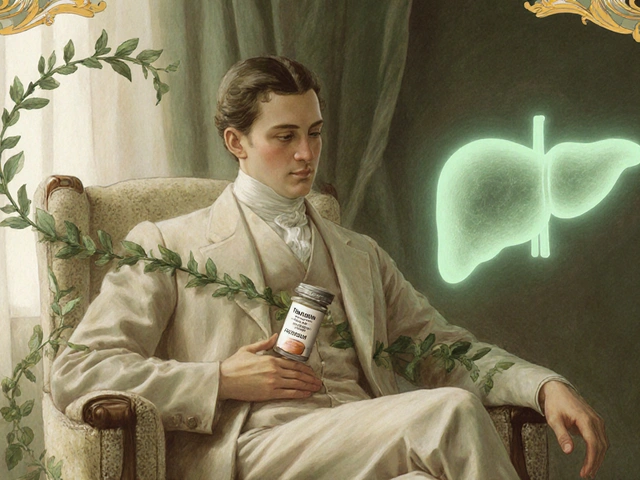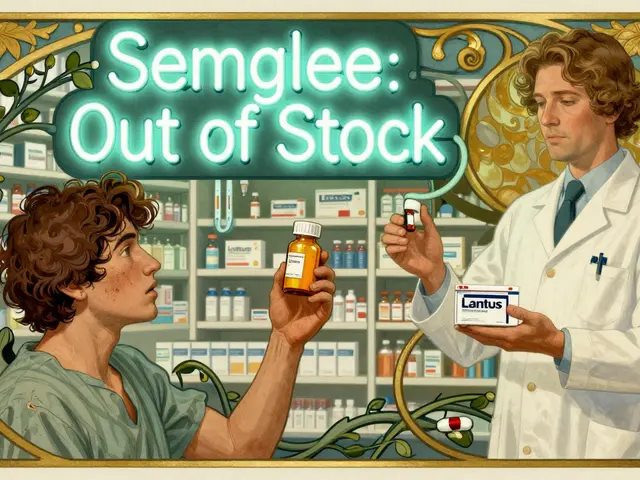One in five people in the UK will get a sexually transmitted infection (STI) at some point in their life. That’s not a scare tactic-it’s a fact from Public Health England’s latest data. Most of these infections don’t cause obvious symptoms, which means many people don’t know they’re infected until it’s too late. The good news? Almost all of the most common STIs are preventable, treatable, and often curable-if you know what to look for and how to protect yourself.
What Are the Most Common STIs Today?
The five most common STIs in the UK right now are chlamydia, gonorrhea, syphilis, herpes (HSV), and human papillomavirus (HPV). These aren’t rare or distant threats. They’re happening in bedrooms, dating apps, and casual encounters across cities like Bristol, Manchester, and London.
Chlamydia is by far the most reported STI in the UK. In 2024, over 200,000 cases were diagnosed. It’s often symptom-free, especially in women. Left untreated, it can lead to pelvic inflammatory disease, infertility, or chronic pain. It’s spread through vaginal, anal, or oral sex-and you can catch it even if your partner doesn’t feel anything.
Gonorrhea is rising fast. Cases have more than doubled since 2010. Symptoms can include painful urination, unusual discharge, or bleeding between periods. But again, many people-especially women-show no signs. If untreated, it can damage reproductive organs and spread to the bloodstream, causing life-threatening complications.
Syphilis used to be rare. Now, it’s back. The number of cases has increased by over 300% in the last decade. It starts with a painless sore, often mistaken for a pimple or ingrown hair. Weeks later, a rash may appear. Without treatment, syphilis can attack the brain, heart, and nervous system years later.
Herpes (HSV-1 and HSV-2) is extremely common. About 1 in 4 adults in the UK has HSV-2, the type usually linked to genital outbreaks. Many don’t know they have it because symptoms are mild or come and go. HSV-1, which causes cold sores, is now a leading cause of genital herpes due to oral sex. There’s no cure, but outbreaks can be managed.
HPV is the most common STI overall. Over 80% of sexually active people will get it at some point. Most types clear on their own, but high-risk strains can cause cervical, anal, throat, and penile cancers. The good news? The HPV vaccine prevents the cancer-causing strains-and it’s offered for free in the UK to teens and young adults.
How Are STIs Spread?
STIs spread through contact with infected bodily fluids: semen, vaginal fluids, blood, or even skin-to-skin contact in the genital area. You don’t need penetration to catch one. Oral sex, sharing sex toys, or touching an infected sore and then your own genitals can pass on infections like herpes, syphilis, or HPV.
Condoms reduce risk-but they don’t eliminate it. Herpes and HPV can live on skin not covered by a condom. That’s why testing and vaccination matter just as much as protection.
How to Prevent STIs: Simple, Proven Steps
Preventing STIs isn’t about fear. It’s about smart habits. Here’s what works:
- Use condoms every time-vaginal, anal, and oral sex. Latex or polyurethane condoms are proven to block fluids carrying chlamydia, gonorrhea, and HIV. For oral sex, use dental dams or cut-open condoms.
- Get vaccinated. The HPV vaccine prevents 90% of HPV-related cancers. It’s free on the NHS for anyone under 25, and available privately for older adults. Hepatitis B vaccine is also recommended if you’re sexually active.
- Get tested regularly. If you’re under 25 and sexually active, get tested for chlamydia at least once a year-or every time you change partners. Testing is free, quick, and confidential. You can order a free home test kit from the NHS website or visit a sexual health clinic.
- Know your partner’s status. Don’t assume. Ask. If someone refuses to get tested, that’s a red flag. You have the right to protect yourself.
- Don’t share sex toys. If you do, clean them thoroughly or use a new condom on them each time. Cover them with a fresh condom before each use.
- Limit partners. The more partners you have, the higher your risk. Monogamy with a tested partner is one of the most effective ways to stay safe.

When and Where to Get Tested
You don’t need symptoms to get tested. In fact, waiting for symptoms means you might already have caused harm.
Free testing is available at:
- NHS sexual health clinics (also called GUM clinics)
- GP surgeries (many offer STI tests)
- Pharmacies with sexual health services
- Home test kits ordered online from the NHS
Tests are simple: a urine sample, a swab, or a blood test. Results come back in days. If you test positive, treatment is usually quick. Chlamydia and gonorrhea? A single antibiotic dose. Syphilis? A penicillin shot. Herpes and HPV? No cure, but medication and monitoring can stop outbreaks and prevent cancer.
Myths That Put People at Risk
Let’s clear up the lies:
- Myth: "I’m only with one person, so I’m safe." Truth: If your partner had a previous partner, you’re at risk. Testing is the only way to know.
- Myth: "I don’t have symptoms, so I don’t have an STI." Truth: Up to 70% of chlamydia cases and 50% of gonorrhea cases show no symptoms.
- Myth: "Condoms protect me 100%." Truth: They reduce risk dramatically, but not for skin-to-skin infections like herpes or HPV.
- Myth: "Only promiscuous people get STIs." Truth: Anyone who has sex can get one. It’s not about morality-it’s about biology.

What Happens If You Don’t Treat an STI?
Ignoring an STI doesn’t make it go away. It makes it worse.
Untreated chlamydia can scar fallopian tubes, leading to ectopic pregnancy or infertility. Gonorrhea can cause chronic pelvic pain and increase HIV risk by 3-5 times. Syphilis can lead to dementia, blindness, or heart failure decades after infection. HPV can silently grow into cancer-often without warning.
And here’s the hidden cost: you can pass it on without knowing. One person with an untreated STI can start a chain reaction through their partners, their partners’ partners, and so on.
What to Do If You Test Positive
First: breathe. Getting an STI doesn’t make you dirty, careless, or broken. It makes you human.
Next: tell your recent partners. It’s hard, but it’s necessary. Sexual health clinics can help you notify partners anonymously. Then: follow your treatment plan exactly. Don’t stop antibiotics early. Don’t have sex until your doctor says it’s safe.
After treatment, get retested. Some infections, like gonorrhea, are becoming resistant to antibiotics. You need to confirm it’s gone.
And finally: don’t stop protecting yourself. One infection doesn’t mean you’re doomed. It means you’re now more aware-and that’s a strength.
Final Thought: Prevention Is Power
STIs aren’t a punishment. They’re a public health issue-and we all have a role in fixing them. Getting tested isn’t shameful. Using condoms isn’t awkward. Talking to your partner isn’t rude. It’s responsibility.
The tools to stop the spread are here: vaccines, tests, treatments, and information. The only thing missing is action. Start today. Get tested. Talk openly. Protect yourself-and others.







Lauren Hale
November 18, 2025 AT 22:44Just want to say how glad I am that this post exists. So many people think STIs are something that happens to ‘other people’-but the truth is, it’s just biology. No shame, no judgment. If you’re sexually active, testing is as routine as brushing your teeth. And the HPV vaccine? It’s a no-brainer. My niece got it at 12. No drama, no fuss. Just protection.
It’s not about being ‘safe’-it’s about being informed. And information is power.
Also, please stop using ‘promiscuous’ like it’s a moral failing. People have different lifestyles. The issue isn’t how many partners, it’s whether they’re getting tested and using protection.
Let’s normalize this stuff. Talk about it at dinner. Bring it up on dates. Make it as casual as asking if someone’s up to date on their flu shot.
rachna jafri
November 20, 2025 AT 06:47Let me tell you something the government doesn’t want you to know-this whole STI panic is just a distraction. They push vaccines and testing so you’ll forget about the real issue: the 5G towers in every city are syncing with your DNA through your phone’s Bluetooth and making you more susceptible to infections. They’ve been doing this since the 90s. The NHS? A front. The ‘free tests’? They’re collecting your biometrics for the New World Order.
And condoms? Plastic mind-control devices. Real protection is spiritual purity and eating raw garlic. I’ve been celibate since 2018. No STIs. No surveillance. No lies.
Hannah Machiorlete
November 21, 2025 AT 04:04I had chlamydia in college and it ruined my life. Not because of the infection-because of how my ex acted after I told him. Like I was some kind of walking biohazard. Like I chose to get it. Like I didn’t cry for three days after the test.
People don’t get it. It’s not a character flaw. It’s a medical thing. And if you’re judging someone for having an STI, you’re the problem. Not them.
Also, why is no one talking about how hard it is to tell someone? Like, how do you even bring that up? ‘Hey, wanna go out? Also, I got tested last week and I’m clean, but I need you to be too.’ Awkward as hell.
And why is herpes still this taboo? I have it. It’s not cute. But it’s not the end of the world either. I’ve had relationships. I’ve had sex. I’m still here.
Stop shaming. Start educating.
Bette Rivas
November 21, 2025 AT 17:38Important correction: while condoms reduce transmission of HSV and HPV, they don’t eliminate it entirely-but that doesn’t mean they’re useless. The data shows consistent condom use reduces chlamydia transmission by up to 70% and gonorrhea by 50–60%. That’s significant.
Also, the claim that ‘80% of sexually active people get HPV’ is accurate, but it’s misleading without context. Over 90% of those infections clear within two years without intervention. The real risk is persistent infection with high-risk strains-hence the importance of the vaccine and cervical screening.
And yes, syphilis is surging. In the U.S., congenital syphilis cases have tripled since 2015. This isn’t just about individual behavior-it’s a public health infrastructure failure. Underfunded clinics, lack of provider training, stigma preventing testing. We need systemic change, not just ‘get tested’ slogans.
Also, dental dams are underused. People think oral sex is ‘safe’-but HSV-1 transmission via oral-genital contact is rising. Use barriers. It’s not awkward. It’s smart.
prasad gali
November 23, 2025 AT 00:26Let’s apply first-principles reasoning. STIs are not ‘common’ because of biology-they’re common because of systemic moral decay. The normalization of casual sex, the erosion of traditional values, the commodification of intimacy. You cannot separate public health from cultural health.
Condoms are a Band-Aid. Vaccines are a temporary shield. The real solution? Abstinence until marriage. Monogamy within covenant relationships. The data is clear: communities with strong social norms around sexual restraint have lower STI rates.
Why are we treating this like a technical problem? It’s a spiritual one. You can’t engineer virtue. You can only cultivate it through discipline, accountability, and cultural reinforcement.
And yes, I know the NHS promotes testing. But testing without repentance is just surveillance with a rubber stamp.
Ankita Sinha
November 25, 2025 AT 00:11I’m from India and I’ve never heard anyone talk about STIs like this before. In my town, people still think it’s ‘something that happens to girls who go out too much.’ But this post? It’s the first time I’ve seen someone explain it like I’m an adult, not a child.
I got tested last year after a bad date. No symptoms. Just… scared. Turned out negative. Felt like I’d won the lottery.
My mom still thinks condoms are ‘unnatural.’ I told her: ‘Mom, if you’d had this info when you were 20, you wouldn’t have spent three years worrying you were infertile.’ She cried.
So thank you. For saying it plainly. For not making it weird. I’m sharing this with my cousins. All of them. Even the ones who think I’m ‘too Western.’
Donald Sanchez
November 26, 2025 AT 06:46ok so i just got back from the clinic and they gave me a shot for syphilis and i’m like… wow this is wild. i thought i was just getting a rash from my new jeans. turns out it was a chancre. 🤯
also i’m 28 and i didn’t know the hpv vaccine was still available for adults?? i got mine last week. now i feel like a responsible adult. 🙌
and no i didn’t tell my ex. he’s still mad i broke up with him. so… yeah. i’m not gonna be the one to ruin his day with medical info. he can get tested himself. lol
also condoms are kinda annoying but i’m not gonna risk it. even if it feels like we’re both wearing a plastic bag during sex. 🤷♀️
Greg Knight
November 26, 2025 AT 18:46Let me tell you something I learned the hard way: STIs don’t care how smart you are, how clean you keep your apartment, or how many self-help books you’ve read. They don’t care if you’re ‘good people.’ They care about exposure. Period.
I was 24. Thought I was being careful. Used condoms. Didn’t have more than two partners in a year. Thought I was doing everything right.
Then I got chlamydia. From someone who swore they were clean. Who’d been tested six months prior. Who didn’t know they were asymptomatic.
That’s the thing no one tells you: you’re not protecting yourself from ‘bad people.’ You’re protecting yourself from human biology. And that means you have to be consistent. Every time. Even when it’s awkward. Even when you’re tired. Even when you’re in love.
And if your partner refuses to get tested? That’s not about trust. That’s about risk. And you have every right to walk away.
Don’t wait for symptoms. Don’t wait for a scare. Don’t wait until it’s too late. Get tested. Talk about it. Normalize it. It’s not a burden. It’s self-respect.
Kenneth Meyer
November 27, 2025 AT 18:08There’s a quiet tragedy here: we treat STIs like moral failures, but we treat cancer like a random act of fate. Why?
Both are biological. Both can be prevented. Both can be silent killers.
But we’ve built a culture where sex is either sacred or sinful-and never just human. So when someone gets an STI, we don’t ask, ‘What happened?’ We ask, ‘What did they do wrong?’
That’s not science. That’s mythology.
And yet, the tools to prevent these infections are among the most effective in modern medicine. Vaccines. Screening. Antibiotics. Education.
So why do we resist them? Not because they don’t work. But because they force us to confront our own discomfort with intimacy, vulnerability, and the messy reality of bodies.
Maybe the real STI isn’t chlamydia or HPV.
Maybe it’s shame.
darnell hunter
November 29, 2025 AT 00:40It is imperative to acknowledge that the statistical prevalence of sexually transmitted infections, as cited herein, is predicated upon diagnostic reporting frameworks that are inherently subject to selection bias and underreporting. The assertion that ‘one in five’ individuals will contract an STI is statistically misleading without clarification of the cohort under study, temporal parameters, and testing frequency.
Furthermore, the recommendation to utilize condoms as a primary preventative modality is scientifically sound, yet insufficiently nuanced. The efficacy of barrier methods is contingent upon correct and consistent usage, which, per CDC behavioral surveillance data, is suboptimal in populations under 30.
Moreover, the suggestion to ‘ask partners about status’ is socially untenable in most contexts, given the absence of legal or cultural norms mandating disclosure. To presume such dialogue is routine is to engage in idealized anthropological fiction.
It is therefore incumbent upon public health institutions to implement mandatory pre-emptive screening protocols, rather than relying upon individual agency, which remains unreliable and inequitable.
Paige Basford
November 30, 2025 AT 19:25Okay but can we talk about how weird it is that we have a whole vaccine for HPV but no one talks about how you can get it from skin contact? Like, I didn’t know you could get it from just touching someone’s genitals and then touching yourself. I thought you had to have sex. 😳
Also, why is the HPV vaccine only free up to 25? I’m 29 and I just found out I can get it for $300. That’s insane. I have a friend who got cervical cancer at 31. She didn’t know she had HPV until it was stage 3.
And why is herpes still called ‘the shame virus’? It’s just a virus. It’s not a breakup. It’s not a betrayal. It’s a virus. People get cold sores all the time and no one cries about it.
Also-dental dams? I didn’t even know those existed until last year. I thought you just… didn’t do oral sex if you were scared. 😅
So much of this feels like we’re all learning it on the job. No one taught us. No one talked about it. And now we’re just… trying not to die.
Danielle Mazur
December 1, 2025 AT 23:35Public Health England is a front for the WHO’s population control agenda. The ‘free tests’ are bait. The vaccines contain microchips that track your sexual behavior. The ‘rising rates’ are fabricated to justify mandatory surveillance programs. They want you to believe you’re powerless-so you’ll hand over your data, your body, your autonomy.
Real protection? Fasting. Prayer. Avoiding all digital devices after sunset. I’ve been symptom-free for seven years. No tests. No shots. No condoms. Just divine intervention.
Don’t be fooled. This isn’t medicine. It’s mind control.
Lauren Hale
December 3, 2025 AT 18:55Wow. I didn’t expect to see a conspiracy theory in this thread. But let’s be real-shame and silence are the real pandemics here. If someone’s scared to get tested because they think they’ll be judged, that’s a failure of culture-not biology.
And if you think vaccines are microchips, you’re not protecting yourself-you’re just afraid. And fear doesn’t keep you safe. Knowledge does.
So I’ll say this again: get tested. Talk to your partner. Use protection. And if someone tells you the NHS is spying on you? Give them a hug. Then hand them a free home test kit.
We don’t need more fear. We need more compassion.